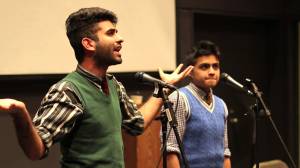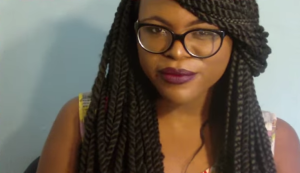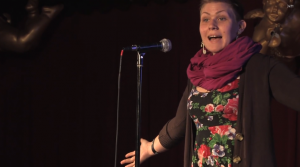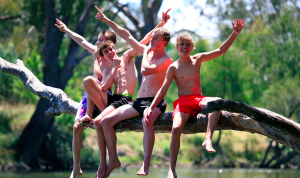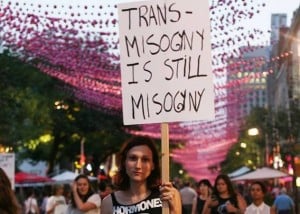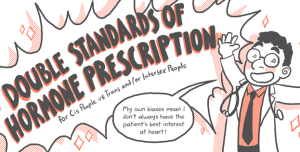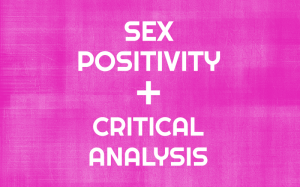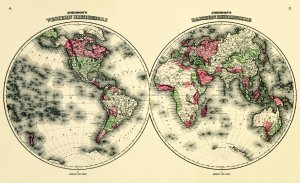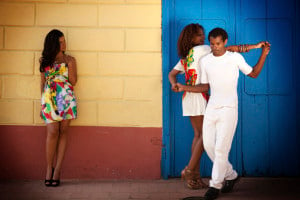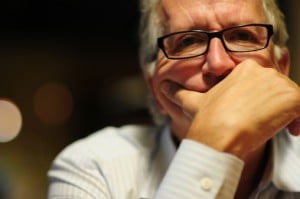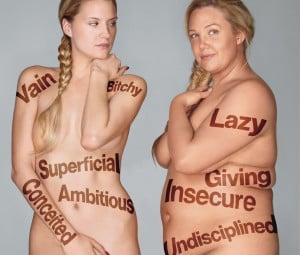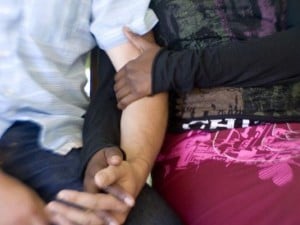My foray into queerness started, quite stereotypically, in my freshman year of college when I was 19.
I tried to convince myself that I was taken aback by my sudden attraction to my cute, androgynous friend in the Queer Straight Alliance club, but in reality, my queerness was actually a long ago discovery that I’d been struggling to cope with for years.
I recognized my attraction to other girls as early as 14, but shoved it to the back of my mind because I was afraid of social consequences.
What if people mistook me for a lesbian and I never got a boyfriend? What if everyone wrote me off as a pathetic attention seeker?
Above all, I worried that my friends would be driven away, creeped out by the prospect that I might try to pursue them romantically.
I decided not to risk social ostracism, so I suppressed my identity crisis for the next five years.
Admittedly, when I finally joined the Queer Straight Alliance, I was not the overly invested straight ally I presented as, but rather a closeted bicurious girl low-key looking for a girlfriend. And given that I was thousands of miles away from home and surrounded by an exciting new community, I finally felt comfortable exploring that attraction.
However, since I was already grappling with internalized biphobia and how I could be into girls after a lifetime of crushes on boys, I defined my queerness around attraction to masculinity.
Liking girls who looked like boys was kind of the same thing as liking boys, right? (Clearly I still had a lot to learn and a lot of issues to work through.)
And while I may have been adjusting to the idea of liking queer folks who were masculine of center, I wasn’t prepared for was the persistent and deeply ingrained misogyny that I often faced from MOC queers.
It’s Not All Rainbows and Gender Equality in Queerlandia
By entering the queer community, I thought I had found a haven from misogyny. Most of us were feminists and especially in the case of queer women, no one seemed to police each other – at least not at first glance.
I was looking forward to reinventing and redefining my identity. Previously, I had assumed that I had to wait around for guys to make the first move, but since all the rules of heteronormativity were now off the table, I took a more active role in initiating relationships.
The novelty of pursuing girls was thrilling to me.
The first woman I had a crush on was pretty much femme catnip as far as bois go. She had a thing for leather jackets and nice cologne. Veering even more into cliche, she fancied herself an amateur poet and frequently wrote about girls who had broken her heart.
One time, she gave me a fake rose, and I felt like I would melt into the floor. It initially felt like the cheesy high school romance I never had.
I was infatuated with her for months, even though I could never work up the nerve to do anything about it. Nonetheless, I was a shameless flirt, and I enjoyed affirming other women’s beauty and wit, whether I had romantic motives or not.
But my rosy experience was soon dulled by the surprising amount of bias I uncovered within the queer community.
Within a year, I realized that I was mostly attracted to masculine of center or androgynous folks, but I couldn’t help but notice that the people I connected with always seemed to dabble in misogyny or biphobia.
My attraction to my first queer crush went downhill when I excitedly tried to explain pansexuality to her, thinking that I may have finally stumbled upon my identity. She responded that it “sounded like bullshit” – hence invalidating my sexual identity and the language I chose to discuss it – and that was the end of that discussion.
Another incident involved a trans guy that I was talking to online. I offhandedly mentioned that I was going to cut my hair, prompting immediate protests from him. He preferred long hair on women.
I was more than a little miffed that he felt entitled to police my presentation – and we hadn’t even met face-to-face yet.
But the most infuriating example came from an androgynous lesbian that I was swooning over. She clearly wasn’t attracted to me, but she tried to blame her unwillingness to date me on my bisexuality.
I had never been with a man, she argued, so once I had had the experience I would gravitate back towards men, even if I was dating a woman at the time. I guess men have some sort of cosmic pull over femmes in her mind.
And ironically, not only did her ex just dump her for cheating, she went on to later identify as bisexual herself! Talk about hypocrisy.
In my mind, by leaving heterosexual and/or cis spaces behind, I was also ditching all the baggage of male privilege and policing of women. But now, my queer interests were telling me how I could and couldn’t identify, why my identity made me undatable, and what I should and shouldn’t look like.
If I didn’t live up to their ideal of what a femme should be, they kicked me to the curb and then pointed the finger at me for being undateable and having the nerve to operate my life in ways that weren’t blatantly seeking their approval all the time.
I was fairly fed up with the masculine side of the queer community.
Weirdly though, such rejection temporarily increased my attraction to them because it fueled my inferiority complex. The more they said I wasn’t worthy of them, the more intent I was on convincing them that I could be.
And that forced me to confront my own internalized misogyny.
I realized that giving a group of people the power to determine how you should feel about yourself (and thereby creating a negative feedback loop that makes you feel worse with every rejection) is obviously unhealthy and not a positive way to seek out partners.
Reactions to Misogyny in the Queer Community (Or Lack Thereof)
For their part, other femmes in my circle seemed to take the casual discrimination in stride. Sure, they might be annoyed, but never enough to actually call out the behavior.
It felt a bit like the queer incarnation of “boys will be boys.” Like MOC queers are just chock full of masculinity, which means that they can’t help acting like irresponsible cads with incredibly misogynistic views towards femmes!
And we, femmes, were supposed to not only excuse this subtle misogyny, but also find it endearing and attractive.
And since I’m essentially calling for more community accountability around this, I’m going to be upfront and say that I don’t have the best taste in people, men or women. I go for emotionally aloof narcissists nine times out of 10, as long as they show an ounce of charisma.
I’ve liked some people who I realized were straight up assholes once the lust factor faded.
I thought, as with heteronormativity, that masculinity was inherently desirable simply for the sake of being masculinity.
Consequently, I didn’t really hold any of my MOC crushes accountable for their character or actions because I felt like their masculine desirability entitled them to a certain amount of leeway and ultimately justified their obnoxious personalities – to a point.
And desirability definitely amounts to privilege.
That cool bravado of self-absorption seems almost expected and even celebrated at times. Even with the less stellar folks that I’ve pursued had plenty of other femmes were always waiting in the wings for their next break-up.
It seemed like none of them were ever single for more than a few weeks at a time.
Those bois could apparently do whatever they want and still have their pick.
And I’m just as guilty as the rest of them, given that I salivated relentlessly over a girl who had cheated on multiple girlfriends.
No matter how badly they fucked up with their femme of the month or how unreliable or just plain unpleasant they proved to be as a person, I was always hopeful that I would be the next girl in line. I wanted the status of being with them. I wanted masculine privilege by proxy.
Thus, I prioritized coddling and enabling bois for the benefit of my own self-gain over calling them out and standing in solidarity with my fellow femmes.
More crucially, I wanted to validate my own femininity to myself.
I wanted to show myself and everyone else that I was sexy and charismatic enough to possess someone that everyone else wanted. And to me at the time, masculinity appeared to be the universal standard of desirability, so I coveted that above any personality flaws or clearly unhealthy relationship tendencies.
More significantly, I’d argue that there is a definite element of masculine privilege in queer circles, and that privilege is protected by everyone involved – including femmes.
Consequently, femmephobia and femme-policing still occurs because masculinity is still viewed as superior to femininity.
By failing to hold MOC queers accountable for casual misogyny, we reinforce the idea that masculinity is synonymous with power and femininity is synonymous with passivity.
Of course, misogyny in the queer community isn’t limited to just MOC queers. Femmes are equally capable of misogyny and should be held equally accountable.
When anyone in the queer community is misogynistic, it sends the message that only certain types of queers are worthy of respect or legitimacy, which certainly isn’t a prejudice I want festering in allegedly safe spaces.
Moving Forward
I think it’s important that we start creating a less toxic environment by first examining internalized prejudices. Like with me, there was a time when I viewed MOC queers as the root of all queer misogyny, but that’s not true.
Such a generalization is an unfair stereotype and it keeps me, and other femmes, from being accountable to the ways we validate, protect, and even invest in it.
Rather than blaming or judging one another, we should all remember what queerness really symbolizes at its core. By identifying as queer, we are boldly rejecting the trappings of mainstream ideas of sex and romance – heteronormativity, gender roles, patriarchy.
It makes no sense to liberate ourselves from these things and then reproduce them in tired, restrictive echoes. Queerness is about celebrating your right to love who you love and make your own sexual choices. Such a radical frontier is no place for stale clichés.
Since we seek to liberate ourselves from oppression and try things differently, let’s start by leaving heteronormative baggage behind.
I want to see a community where all women can be empowered to make their own decisions about their appearances and their bodies, free of being assigned arbitrary value based on their gender expression or sexual activities.
I want a community where everyone’s identity is validated and encouraged, regardless of where they fall on the Kinsey scale or the gender binary.
I want a community where everyone is treated with equal respect.
I know we can do it, so let’s make it happen.
[do_widget id=”text-101″]
Erin Tatum is a Contributing Writer at Everyday Feminism. She’s a feminist, queer theory lover, and television enthusiast living in Pennsylvania. She is particularly interested in examining the representation of marginalized identities in media. In addition to Everyday Feminism, she’s also a weekly contributor to B*tch Flicks. Follow her on Twitter @ErinTatum91.
Search our 3000+ articles!
Read our articles about:
Our online racial justice training
Used by hundreds of universities, non-profits, and businesses.
Click to learn more
Most Read Articles
- « Previous
- 1
- …
- 30
- 31
- 32






